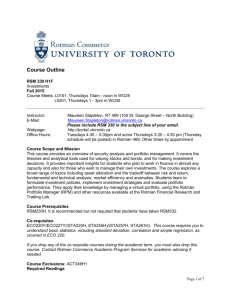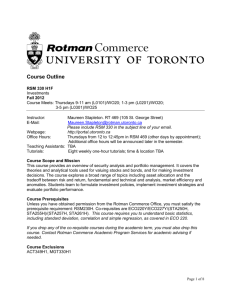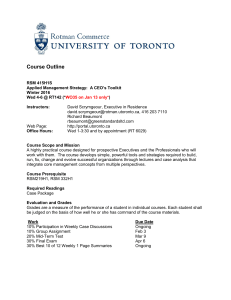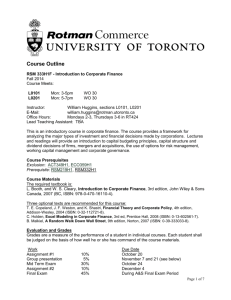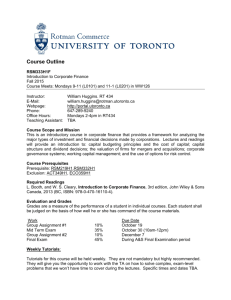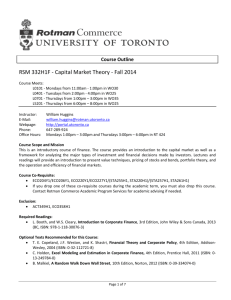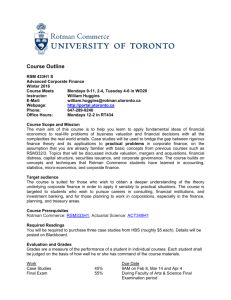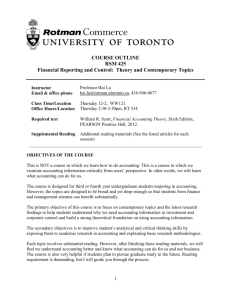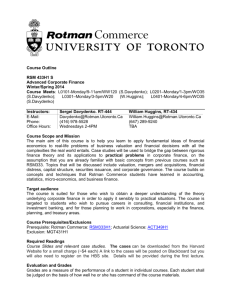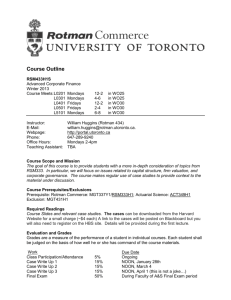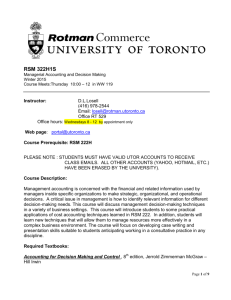RSM 330H1S
advertisement
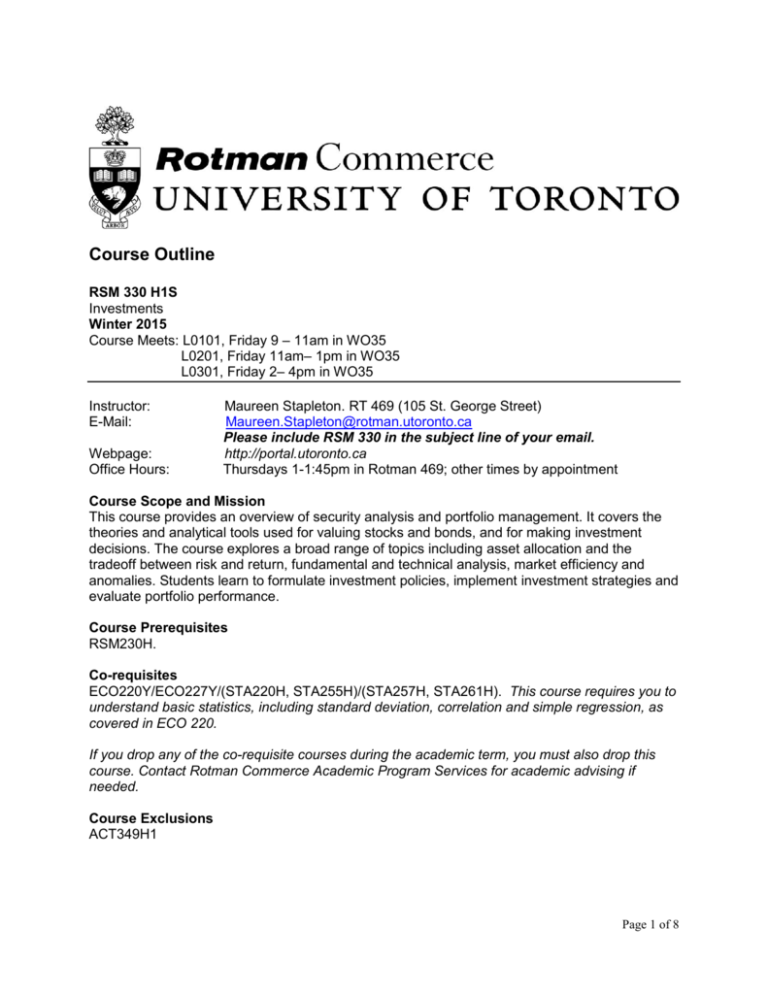
Course Outline RSM 330 H1S Investments Winter 2015 Course Meets: L0101, Friday 9 – 11am in WO35 L0201, Friday 11am– 1pm in WO35 L0301, Friday 2– 4pm in WO35 Instructor: E-Mail: Webpage: Office Hours: Maureen Stapleton. RT 469 (105 St. George Street) Maureen.Stapleton@rotman.utoronto.ca Please include RSM 330 in the subject line of your email. http://portal.utoronto.ca Thursdays 1-1:45pm in Rotman 469; other times by appointment Course Scope and Mission This course provides an overview of security analysis and portfolio management. It covers the theories and analytical tools used for valuing stocks and bonds, and for making investment decisions. The course explores a broad range of topics including asset allocation and the tradeoff between risk and return, fundamental and technical analysis, market efficiency and anomalies. Students learn to formulate investment policies, implement investment strategies and evaluate portfolio performance. Course Prerequisites RSM230H. Co-requisites ECO220Y/ECO227Y/(STA220H, STA255H)/(STA257H, STA261H). This course requires you to understand basic statistics, including standard deviation, correlation and simple regression, as covered in ECO 220. If you drop any of the co-requisite courses during the academic term, you must also drop this course. Contact Rotman Commerce Academic Program Services for academic advising if needed. Course Exclusions ACT349H1 Page 1 of 8 Required Readings Textbook: Z. Bodie, A. Kane, A. Marcus, S. Perrakis, and P. Ryan, Investments, McGraw-Hill Ryerson, 7th Canadian Edition, 2011. Other required readings: A selection of brief readings from current industry sources will be posted on Blackboard. http://portal.utoronto.ca All students are required to read the business section of the Globe and Mail or the National Post on a daily basis and be prepared to discuss recent financial news. Cases can be downloaded from the Harvard Website for a small charge (link to be posted). Class Notes: The slides that we use for our discussions in class will be posted on Blackboard. Supplementary Textbooks: Cleary and Jones, Investments, Analysis and Management, Wiley, 3rd Canadian edition, 2009 (A very readable text which references CFA exam materials) Booth and Cleary, Introduction to Corporate Finance, (3nd ed) John Wiley & Sons, 2012. (This is the textbook for RSM 332) Both supplementary texts are available on reserve in the BIC. Evaluation and Grades Grades are a measure of the performance of a student in individual courses. Each student shall be judged on the basis of how well he or she has command of the course materials. Exams will test comprehension and not merely students‟ memorization skills. We will have two group homework assignments, a group project, a midterm exam, and a final exam. The course grade will be computed as follows: Homework: Group Project: Midterm Exam: Final Exam: 10% 15% 25% 50% The midterm exam is a 90 minute required test that will take place on February 27 from 2pm to 3:30pm in EX100.There will be no make-up midterm exam under any circumstances. Before the March 8 drop date, marks for the midterm exam and one homework assignment will be posted. The final exam will be comprehensive, covering all materials discussed in class. Homework Assignments There will be two group homework assignments which require you to apply techniques discussed in class to actual data (using Excel, the Rotman Finance Lab and various online sources of financial information). You will have two weeks to complete each assignment. Page 2 of 8 You are expected to work on your project and assignments in groups of three or four persons. The maximum number allowed for any group four students and the minimum number is three. No individual projects or assignments will be accepted. You are responsible for forming or joining a group before January 17 and for signing up your group on Blackboard. You may form a group with students in any section of the course. Only one copy of the write-up should be submitted for each group. Every member of the group will receive the same mark on the assignment. Please use the Rotman Commerce cover sheet. Please do not hand in unedited computer outputs. Instead, present carefully-edited results. Clarity and conciseness in presenting your analysis and conclusions will be rewarded. All assignments must be typed and securely stapled. Project There will be a group project. The minimum number of students in a group is three and the maximum number is four. Groups may be formed among students in any section of the course. The objective of this project is for students to obtain hands-on experience in applying concepts learned in this course to the management of a portfolio. Students will use the resources of the Rotman Financial Research and Trading Lab, as well as other sources of information, to research and implement investment strategies, and report on their results. Further information about the project will be provided in class and posted on the portal. COURSE FORMAT AND EXPECTATIONS Written Work: Please note that clear, concise, and correct writing will be considered in the evaluation of your homework assignments and your project report. That is, you may lose points for writing that impedes communication: poor organization, weak paragraph development, excessive wordiness, hard-to-follow sentence structure, spelling mistakes and grammatical errors. Students who require additional support and/or tutoring with respect to their writing skills are encouraged to visit the Academic Success Centre (www.asc.utoronto.ca) or one of the College Writing Centres (www.writing.utoronto.ca/writing-centres). These centres are teaching facilities – not editing services, where trained staff can assist students in developing their academic writing skills. There is no charge for the instruction and support. Group Work: Homework assignments and the Project require you to work in teams of 3 to 4 students. Learning to work together in teams is an important aspect of your education and preparation for your future careers. That said, project-based teamwork is often new to students and you are therefore reminded of the following expectations with respect to behaviour and contributions to your team project. 1. Read the document entitled, “Working in Teams: Guidelines for Rotman Commerce Students” which is available on the RC portal under the Academic Services tab. 2. When working in a team, Rotman Commerce students are expected to: Treat other members with courtesy and respect; Honour the ground rules established by the team; Page 3 of 8 Contribute substantially and proportionally to the final project; Ensure enough familiarity with the entire contents of the group project/assignment so as to be able to sign off on it as original work; Meet the project timeline as established by the team. 3. Resolving differences: Conflicts can – and do – occur. Conflicts are part of the team‟s process of learning how to work together effectively and can actually generate exciting debate and creative solutions – if managed appropriately. Student teams are collectively expected to resolve disputes or misunderstandings as soon as they arise (and prior to submission of assignments and news articles). In cases where teams are unable to reach a mutually agreeable solution, the entire team must meet with the Rotman Commerce Team Coach** as soon as possible. The Coach will listen to the team and help develop options for improving the team process. All members of the project team must commit to, and, utilize their action plans. ** For an appointment with a Rotman Commerce Team Coach, please contact Nikoleta Vlamis at nikoleta@nikoletaandassociates.com or Elaine Zapotoczny at elaine@nikoletaandassociates.com. Nikoleta and Elaine are highly skilled at facilitating team dynamics and collaboration. Note that the Team Coach‟s s role is to provide guidance, support and advice on team matters – not to formally evaluate or assess teamwork for academic purposes. Class Schedule and Readings: Session #1 January 9 #2 January16 #3 January 23 Topic Readings Overview of the course; Asset classes, ETFs & markets Class Note 1 Bodie Ch. 1.3,1.4,1.6, 2.1-2.4, 3.2-3.5 (review) Ch 22.1 - 22.7 (omit pages 818-824 & 832 to 838) Information on your Group Project What drives equity performance? Investment Strategies & Styles; Assignment 1 will be posted Finance Lab - RPM & Capital IQ Open your Group RPM accounts Equity Risk Premiums & Reaction to News; Technical Analysis Rotman Portfolio Manager (RPM) Quick Start Guides for Students Class Note 2 Bodie: Chapter 15.5-15.7 Readings: Morningstar StyleBox; iShares ETFs; Screening Stocks Class Note 3 Bodie: Chapters 4.1-4.7, 5.1– 5.6 & 10.2-10.7 Readings: Some Basics about Returns; (Wang); What has worked on Bay Street? Page 4 of 8 #4 Asset Allocation & Optimal Portfolios January 30 RPM practice period ends Jan. 30 1 page Fund Proposal due #5 Asset Allocation & Investment Policies February 6 Assignment 1 due Class Note 4 Bodie: Chapter 6.1 – 6.5; 10.1;23.1-23.2 (omit pg 879-880); 23.4; Readings: Exchange Rate Risk (Wang) Class Note 5 Bodie: Chapter 21.1 – 21.2; Appendix 22B Case: Partners Healthcare Class Note 6 #6 CAPM & Multi-factor Models #7 February 27 #8 Mid Term Exam EX100 – 2 -3:30pm No regular class this week Fundamental Analysis of Equities March 13 #10 March 20 #11 March 27 Closed Book Exam No aids allowed Class Note 7 Fundamental Analysis of Equities Bodie: Chapter 15 Readings:Practical Tools for Analyzing Value Stocks; How to write a great research report March 6 #9 Bodie: Chapters 7.1-7.2; 8.1-8.4; 11.1 & 11.3 Readings: „Multifactor Models” Optional: “MPT & CAPM”- both by Prof Wang February 13 Market Efficiency, & Anomalies, Performance Measurement & GIPS; Assignment 2 will be posted Bonds Term Structure of Interest Rates Assignment 2 is Due Bond Portfolio Management Cease Trading RPM on Friday, March 27 Class Note 8 Bodie Chapter 9.1-9.5; 20.1 - 20.7 Class Note 9 Bodie Chapters 12.2-12.5;13.1-13.5 Case: Dimensional Fund Advisors Class Note 10 Bodie Chapter 14.1 – 14.4 Readings: CIBC White Paper; One of the Most Profitable Strategies in Bond Investing” Group Project due April 2 at 4 pm in the Rotman Commerce Office FINAL EXAM Date, time & location to be announced The final exam is cumulative and will cover all course material Page 5 of 8 POLICY AND PROCEDURE Missed Tests and Assignments (including midterm examinations) Students who miss a test or assignment for reasons entirely beyond their control (e.g. illness) may submit a request for special consideration. Provided that notification and documentation are provided in a timely manner, and that the request is subsequently approved, no academic penalty will be applied. In such cases, students must notify Rotman Commerce on the date of the missed test (or due date in the case of course work) and submit supporting documentation (e.g. Verification of Student Illness or Injury form) to the Rotman Commerce Program Office within 48 hours of the originally scheduled test or due date. Students who do not provide Rotman Commerce or the instructor with appropriate or sufficient supporting documentation will be given a grade of 0 (zero) for the missed test or course deliverable. Note that the physician’s report must establish that the patient was examined and diagnosed at the time of illness, not after the fact. Rotman Commerce will not accept a statement that merely confirms a report of illness made by the student and documented by the physician. Missed Mid Term Exams: There will be no make-up midterm exam. Students who miss the midterm exam for valid documented reasons will have grades reallocated to their final exam. Late Submission of Assignments and News Article Summaries - Late submissions will not be accepted unless there are valid medical reasons supported by a doctors‟ note. Students must email their instructor on the due date and provide supporting documentation to the Rotman Commerce Office within 48 hours. Accessibility Needs The University of Toronto is committed to accessibility. If you require accommodations for a disability, or have any accessibility concerns about the course, the classroom or course materials, please contact Accessibility Services as soon as possible: disability.services@utoronto.ca or http://www.accessibility.utoronto.ca/. Academic Integrity Academic Integrity is a fundamental value essential to the pursuit of learning and scholarships at the University of Toronto. Participating honestly, respectively, responsibly, and fairly in this academic community ensures that the UofT degree that you earn will continue to be valued and respected as a true signifier of a student's individual work and academic achievement. As a result, the University treats cases of academic misconduct very seriously. The University of Toronto’s Code of Behaviour on Academic Matters http://www.governingcouncil.utoronto.ca/policies/behaveac.htm outlines the behaviours that constitute academic misconduct, the process for addressing academic offences, and the penalties that may be imposed. You are expected to be familiar with the contents of this document. Potential offences include, but are not limited to: In papers and assignments: Using someone else's ideas or words without appropriate acknowledgement. Page 6 of 8 Submitting your own work in more than one course without the permission of the instructor. Making up sources or facts. Obtaining or providing unauthorized assistance on any assignment (this includes collaborating with others on assignments that are supposed to be completed individually). On test and exams: Using or possessing any unauthorized aid, including a cell phone. Looking at someone else's answers Misrepresenting your identity. Submitting an altered test for re-grading. Misrepresentation: Falsifying institutional documents or grades. Falsifying or altering any documentation required by the University, including (but not limited to), medical notes. All suspected cases of academic dishonesty will be investigated by the following procedures outlined in the Code of Behaviour on Academic Matters. If you have any question about what is or is not permitted in the course, please do not hesitate to contact the course instructor. If you have any questions about appropriate research and citation methods, you are expected to seek out additional information from the instructor or other UofT resources such as College Writing Centres or the Academic Success Centre. Email At times, the course instructor may decide to communicate important course information by email. As such, all UofT students are required to have a valid UTmail+ email address. You are responsible for ensuring that your UTmail+ email address is set up AND properly entered on the ROSI system. For more information please visit http://help.ic.utoronto.ca/category/3/utmail.html Forwarding your utoronto.ca email to a Hotmail, Gmail, Yahoo or other type of email account is not advisable. In some cases, messages from utoronto.ca addresses sent to Hotmail, Gmail or Yahoo accounts are filtered as junk mail, which means that important messages from your course instructor may end up in your spam or junk mail folder. Blackboard and the Course Page The online course page for this course is accessed through Blackboard. To access the course page, go to the UofT Portal login at https://portal.utoronto.ca/ and log in using your UTORid and password. Once you have logged in, look for the My Courses module where you‟ll find the link to all your course websites. If you don‟t see the course listed here but you are properly registered for the course in ROSI, wait 48 hours. If the course does not appear, go to the Information Commons Help Desk in Robarts Library, 1st floor, for help, or explore the Portal Information and Help at www.portalinfo.utoronto.ca/students and review the Frequently Asked Questions. Recording Lectures Lectures and course materials prepared by the instructor are considered by the University to be an instructor‟s intellectual property covered by the Canadian Copyright Act. Students wishing to record a lecture or other course material in any way are required to ask the instructor‟s explicit permission, and may not do so unless permission is granted (note: students who have been Page 7 of 8 previously granted permission to record lectures as an accommodation for a disability are, of course, excepted). This includes tape recording, filming, photographing PowerPoint slides, Blackboard materials, etc. If permission is granted by the instructor (or via Accessibility Services), it is intended for the individual student‟s own study purposes and does not include permission to “publish” them in anyway. It is absolutely forbidden for a student to publish an instructor‟s notes to a website or sell them in any other form without formal permission. . Page 8 of 8
